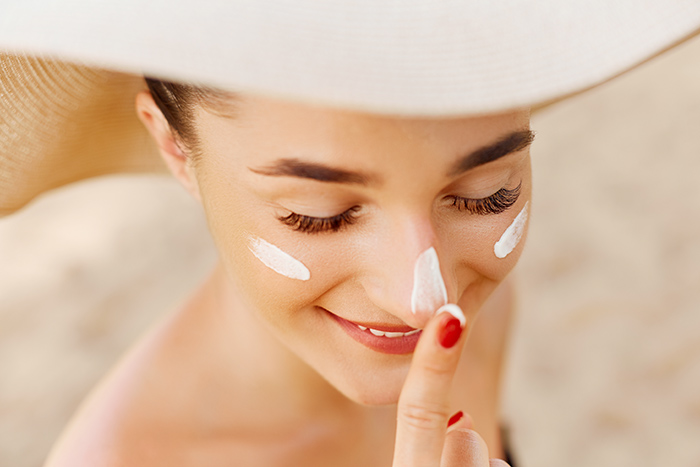
While it may be easier to remember to protect skin from potentially harmful UVA and UVB rays by regularly applying sunscreen during the hot, sun-drenched days of summer, many adults still fail to apply their SPF every day. As summer draws to a close it is important to understand that sunscreen application is an important process all year long, regardless of the season.
While daily beach trips and pool days may come to an end when fall begins, using a 100% mineral broad-spectrum sunscreen is still a daily essential to help protect your skin and minimize damage. The right products can not only help prevent sunburn but also protect from UVA and UVB rays that can lead to sun damage, dry skin, premature signs of aging and skin cancer.
Dr. DiAnne Davis, a board-certified dermatologist and laser and cosmetic surgeon based in Dallas, Texas, refers to sunscreen as “one of the holy grails in skincare.” The best sunscreens available, she notes, actively improve skin by replacing natural lipids called ceramides.
“Ceramides are one of the building blocks found naturally in skin, and as we get older, we start to lose the ceramides that help us maintain a healthy skin barrier,” she explains. “That’s why I recommend products that contain essential ceramides, which lock in moisture to help prevent dryness, irritation and environmental damage.”
When establishing a skincare routine, ceramides should be incorporated in everything from your moisturiser to sunscreen. In fact, according to new insights from a peer-reviewed publication featured in the Journal of Drugs in Dermatology titled, “Efficacy of Ceramide-Containing Formulations on UV-Induced Skin Surface Barrier Alterations,” a skincare regimen that includes a moisturizer and sunscreen formulated with ceramides can help protect against UV-induced skin barrier damage and improve skin barrier health overall against chronic sun exposure.
With a focus on health and beauty, Davis shares the following tips to keep in mind as you establish a sunscreen routine to carry you through autumn and into the colder months of the year.
Understand sunscreen is necessary for all skin types. People of all skin types and tones need broad-spectrum protection from UVA and UVB rays for optimal skin health. Fortunately, CeraVe offers a wide range of products that are formulated to suit different skin types and concerns. If your skin is sensitive or easily irritated, you might opt for a mineral sunscreen containing ingredients such as zinc oxide and titanium dioxide. Mineral sunscreens create a barrier on the skin’s surface to effectively protect from the sun’s harmful rays.
Choose a sunscreen developed by dermatologists. Not all sunscreens are created equal, so you’ll want to find one formulated with ingredients that not only protect your skin from harmful UVA and UVB rays but also provide additional skincare benefits. A surprising number of survey respondents are unaware that sunscreen can provide extra beauty benefits; 51% don’t realize it can hydrate the skin and 94% have never sought barrier-restoring ingredients like ceramides. When it comes to SPF protection, CeraVe Hydrating Mineral Sunscreen SPF 30 Sheer Tint optimizes three essential ceramides to restore the skin barrier, plus hyaluronic acid to maintain moisture and niacinamide to soothe irritation. The tinted, 100% mineral sunscreen offers a sheer, natural finish that blends seamlessly into skin while providing all-day hydration and a healthy glow.
Make it a habit: Use sunscreen each day regardless of weather — even when indoors. Twenty-eight percent of U.S. adults believe they only need sunscreen protection in sunny weather, according to the survey. However, since UVA and UVB rays can still penetrate through clouds and UVA rays can also penetrate through windows, Davis advises applying a high-quality hydrating sunscreen as part of your daily routine — all day, every day, year-round. “Sunscreen isn’t just for pool days, but for fall activities too, like attending a football game or picking your favorite pumpkin from the patch,” she notes. “And, even if you are staying indoors as the temperature drops, you are still exposed to the sun through your windows.”
Reapply sunscreen generously and frequently. In the survey, 58% of respondents report that they only apply sunscreen when spending multiple hours outside. However, the FDA recommends generously reapplying a broad-spectrum SPF at least every two hours, starting 15 minutes before you leave. In general, an average-sized adult or child needs at least one ounce of sunscreen (enough to fill a shot glass) to evenly cover the body.